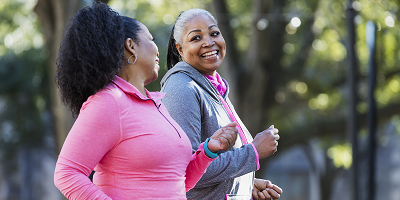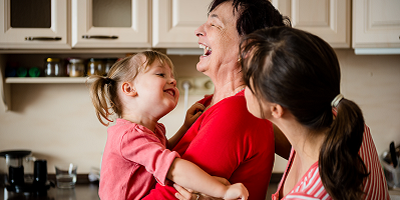
On average, women live longer than men. That's why it's important for women to focus on their financial, physical and mental well being.
For example, for women with a male partner, there's a higher likelihood that they will be alone at some point later in life. A longer life also means they may need more retirement savings to live comfortably. Yet women often have less savings than men.
In short, this is the longevity gap. This gap is why women need to think carefully about how to plan for what's ahead.
While you can't know the future, you can take steps to prepare.
What's behind the longevity gap?
According to 2020 census data, the life expectancy for women is 80.5 — compared to 75.1 for men.
Looking at life expectancy data alongside U.S. Census Bureau data about retirement savings reveals a bit more of the story. About 50% of women ages 55 to 66 have no personal retirement savings, compared to 47% of men. Plus, only 22% of women have $100,000 or more in personal retirement savings, whereas 30% of men do.
The news may be even more grim, according to a National Institute on Retirement Security report. It found that women are 80% more likely than men to experience poverty in their retirement years.
In addition to living longer than men, women also:
- Typically make less on the dollar than men
- Work fewer years than men if they take a career break
- Tend to invest more cautiously than men.
All of this adds up to less money in women's portfolios when it's time to retire.
Health is another factor when it comes to the longevity gap. According to the latest health statistics from the Centers for Disease Control, about 14% of women 18 and older are in poor health. And less than half of women 18 and older meet the physical activity guidelines.
So how can women financially, physically and mentally prepare to live longer?
Save earlier and save more
Not only do women tend to make less than men, earning 84% of what men earn, according to a Pew Research Center study, they are more likely to live alone in later years, because of separation, divorce or being widowed.
This is why it's crucial for women to have a retirement savings plan, starting as early as possible. If it is available, an easy way to start is with a company-provided retirement account.
Also, remember that investing doesn't need to be complicated. In fact, you likely know more than you think. Working with a financial professional is one way to increase your financial literacy.
Relegating investment decisions to a spouse or partner can leave you out of important conversations. This matters, because there is a good chance that you will have to make financial decisions by yourself at some point, whether through being widowed or divorced (the rates of divorce after the age of 50 have increased in the last several years).
Improving your financial literacy increases your financial security. It can also help with emotional health, since worry over money is consistently linked to anxiety and depression.
Focus on healthy living
Women have unique health needs at different stages of life. To prepare to live a long and happy life, talk to your doctor each year about what steps you can take to maximize your health.
Certain vaccinations, like flu, Covid-19 and tetanus-diphtheria, are important for lifelong health. Other vaccinations and health concerns cluster around certain age groups. Your healthy living plan changes with each decade. For example:
- In your 20s and 30s: Have open conversations with your doctor about your health goals. It's important to take charge of your health from a young age to lower your risk for conditions like diabetes and heart disease.
- In your 40s and 50s: Make sure to get recommended screenings for breast cancer, colon cancer and other health conditions based on your family history.
- In your 60s, 70s and older: As women get older, it's increasingly important to get vaccinations for flu, pneumonia, shingles and other conditions you may be at risk for. Talk to your doctor about bone health and heart health.
Tend to your emotional health
Research suggests that one in five women is dealing with a mental health condition. Some of us are genetically predisposed to develop mental health conditions. For other women, the stress of life can trigger things like anxiety and depression.
In addition to working with a doctor or mental health professional, understanding what factors affect your mental well-being can help you better tend to your emotional health. You may have already developed coping skills for dealing with anxiety and worries. Think about ways you can make these habits lifelong.
Consider some of the following small changes that may help improve your emotional health:
- Get more sleep
- Include exercise in your daily routine
- Try meditation or yoga
- Pick up a new hobby
- Keep a diary or journal to record your feelings
- Limit caffeine, junk food or alcohol
- Cut back on your time commitments and say "no" more often
Consider what habits you have now that can grow, adapt and change with you as you age. The more you cement a habit when you're younger, the more it's part of who you are and how you live.
Are you prepared?
Learning more about saving for retirement, focusing on physical health and developing lifelong mental health coping techniques are all strategies women can use to manage the longevity gap.
Learn more about how to take care of your physical and mental well-being.
SM.4257124.10.22





 To exercise your privacy choices,
To exercise your privacy choices,